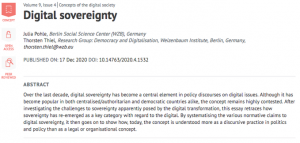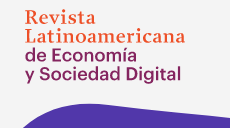 Der von Thorsten und Julia Pohle Ende 2020 in Internet Policy Review veröffentlichte Text Digital Sovereignty, in dem sie die Diskursgeschichte des Souveränitätsdiskurses etwas aufschlüsseln und europäische Verwendungen differenzieren, ist in einer spanischen Übersetzung erschienen: Soberanía Digital. Veröffentlicht ist er im Magazin Revista Latinoamericana de Economía y Sociedad Digital, von dem auch die Übersetzung verantwortet wurde. Wir finden es ist ein tolles Gefühl Texte unserer Arbeitsgruppe in einer Sprache lesbar zu wissen, an der die meisten von uns kontinuierlich gescheitert sind.
Der von Thorsten und Julia Pohle Ende 2020 in Internet Policy Review veröffentlichte Text Digital Sovereignty, in dem sie die Diskursgeschichte des Souveränitätsdiskurses etwas aufschlüsseln und europäische Verwendungen differenzieren, ist in einer spanischen Übersetzung erschienen: Soberanía Digital. Veröffentlicht ist er im Magazin Revista Latinoamericana de Economía y Sociedad Digital, von dem auch die Übersetzung verantwortet wurde. Wir finden es ist ein tolles Gefühl Texte unserer Arbeitsgruppe in einer Sprache lesbar zu wissen, an der die meisten von uns kontinuierlich gescheitert sind.
Schlagwort: Digital Sovereignty
CfP: Weizenbaum Conference 2022
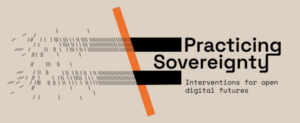 Die vierte Weizenbaum Conference soll am 9. und 10. Juni 2022 in Berlin unter dem Titel „Practicing Sovereignty. Interventions for open digital futures“ stattfinden. Bei der internationalen und interdisziplinären Konferenz soll es darum gehen, neue Möglichkeiten digitaler Partizipation, alternative Technologien, soziale Praktiken und Policy-Making im Kontext der digitalen Souveränität zu erörtern. Die Konferenz verbindet wissenschaftliche Perspektiven mit künstlerischen und aktivistischen Ansätzen, mit dem Ziel, die digitale Transformation aktiv und kritisch mitzugestalten.
Die vierte Weizenbaum Conference soll am 9. und 10. Juni 2022 in Berlin unter dem Titel „Practicing Sovereignty. Interventions for open digital futures“ stattfinden. Bei der internationalen und interdisziplinären Konferenz soll es darum gehen, neue Möglichkeiten digitaler Partizipation, alternative Technologien, soziale Praktiken und Policy-Making im Kontext der digitalen Souveränität zu erörtern. Die Konferenz verbindet wissenschaftliche Perspektiven mit künstlerischen und aktivistischen Ansätzen, mit dem Ziel, die digitale Transformation aktiv und kritisch mitzugestalten.
Beiträge zur Konferenz in Form von Papers oder Workshops bzw. Project Presentations können bis zum 15. Februar 2022 eingereicht werden. Ausführliche Informationen dazu gibt es im Call.
Neu: Band „Practicing Sovereignty“ mit Beitrag von Julia Pohle und Thorsten Thiel
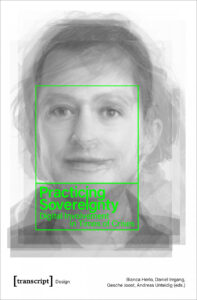 Beim transcript-Verlag ist der Sammelband „Practicing Sovereignty. Digital Involvement in Times of Crises“ neu erschienen, herausgegeben von Bianca Herlo, Daniel Irrgang, Gesche Joost und Andreas Unteidig. Die Beiträge diskutieren kritisch das derzeit oft herangezogene Konzept der digitalen Souveränität im Kontext von Krisen wie der gegenwärtigen Corona-Pandemie. Zudem werden Möglichkeiten zur Partizipation und Gestaltung von durch die Digitalisierung ausgelösten Entwicklungen aufgezeigt. Mit dabei ist auch ein Beitrag von Julia Pohle und Thorsten, in welchem die beiden untersuchen, wie sich das Konzept der Souveränität in Bezug auf das Digitale gewandelt hat. Der Beitrag ist ein Wiederabdruck eines Artikels aus der Internet Policy Review von 2020, welcher hier abrufbar ist.
Beim transcript-Verlag ist der Sammelband „Practicing Sovereignty. Digital Involvement in Times of Crises“ neu erschienen, herausgegeben von Bianca Herlo, Daniel Irrgang, Gesche Joost und Andreas Unteidig. Die Beiträge diskutieren kritisch das derzeit oft herangezogene Konzept der digitalen Souveränität im Kontext von Krisen wie der gegenwärtigen Corona-Pandemie. Zudem werden Möglichkeiten zur Partizipation und Gestaltung von durch die Digitalisierung ausgelösten Entwicklungen aufgezeigt. Mit dabei ist auch ein Beitrag von Julia Pohle und Thorsten, in welchem die beiden untersuchen, wie sich das Konzept der Souveränität in Bezug auf das Digitale gewandelt hat. Der Beitrag ist ein Wiederabdruck eines Artikels aus der Internet Policy Review von 2020, welcher hier abrufbar ist.
Der komplette Sammelband ist als Open Access auf der Website von transcript verfügbar.
Beitrag von Julia Pohle und Thorsten Thiel: Digitale Souveränität
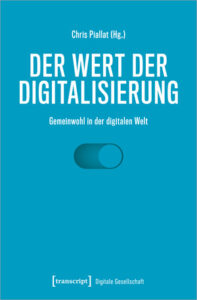 Der neue Sammelband von Chris Piallat „Der Wert der Digitalisierung. Gemeinwohl in der digitalen Welt“ ist jetzt bei transcript erschienen und als Open Access verfügbar. Mit dabei ist auch ein Beitrag von Julia Pohle und Thorsten zu Digitaler Souveränität. Die beiden beleuchten darin kritisch die Karriere des Konzept der digitalen Souveränität in Deutschland und Europa und den dazugehörigen Diskurs. Zudem erörtern sie aus einer normativ-demokratietheoretischen Perspektive die Defizite der gegenwärtigen Verwendungsweise und schlagen vor, wie die zentralen Werte von Demokratie und Gemeinwohl von progressiven Akteur*innen besser vorgetragen werden können.
Der neue Sammelband von Chris Piallat „Der Wert der Digitalisierung. Gemeinwohl in der digitalen Welt“ ist jetzt bei transcript erschienen und als Open Access verfügbar. Mit dabei ist auch ein Beitrag von Julia Pohle und Thorsten zu Digitaler Souveränität. Die beiden beleuchten darin kritisch die Karriere des Konzept der digitalen Souveränität in Deutschland und Europa und den dazugehörigen Diskurs. Zudem erörtern sie aus einer normativ-demokratietheoretischen Perspektive die Defizite der gegenwärtigen Verwendungsweise und schlagen vor, wie die zentralen Werte von Demokratie und Gemeinwohl von progressiven Akteur*innen besser vorgetragen werden können.
Weizenbaum Colloquium with Irina Kalinka
 This week’s issue of Weizenbaum Colloquium was held by our fellow Irina Kalinka, who presented us her dissertation topic „The Political Imaginary of User democracy“.
This week’s issue of Weizenbaum Colloquium was held by our fellow Irina Kalinka, who presented us her dissertation topic „The Political Imaginary of User democracy“.
Contemporary debates about the political impact of digital platforms in the West often revolve around a central, limiting dichotomy: Does digital media revitalize or hurt democracy? Irina’s dissertation project instead shifts the focus to the normative conceptualizations of democracy that are embedded within the platforms themselves. How do they define citizenship, „healthy“ public discourses and the associated practices and pedagogies? Irina understands these underlying assumptions and efforts as the political imaginary of „User Democracy“. She criticizes this notion of democracy, in which subjects are encouraged to imagine themselves as ‚citizen-users‘ of the digital public space provided by platforms. In contrast, she argues for an emancipatory understanding of democracy rooted in the political ethos of (digital) agonism, which emphasizes that popular sovereignty is not an object to be facilitated from above, but a continuous, collective process of struggle around what it means to be in common with others.
Thank you very much, Irina, for your insightful presentation and the subsequent fruitful discussion!
Weizenbaum Colloquium with Irina Kalinka
Tuesday, 23rd of February 2021, 2 pm – 3 pm
Weizenbaum-Institut, online



Contemporary debates about the political impact of digital platforms in the West often revolve around a central, limiting dichotomy: Does digital media revitalize or hurt democracy? This project shifts the focus to show how digital platforms are not only facilitators – of both democratic and anti-democratic endencies – but also engender their own normative conceptualization of democracy. This includes defining what information is in the public interest, what constitutes “healthy” public discourse, and what are good citizenship practices and pedagogies. What emerges from such efforts is a political imaginary I call ‘User Democracy.’
User Democracy is informed by a technocratic understanding of politics, including the valorization of data and automation, predictability, and systematization. Community and popular sovereignty are here imagined as operational and, thus, potentially programmable, which devalues the need for political contestation, inherent in questions of history, justice, and equality, to play out in a truly public setting. Instead, digital public life is facilitated for political subjects through the ‘service’ of interface-design, algorithmic filters, or user manuals. Under this framework, democracy is seen as a project of optimization and management, not common struggle. Subjects are encouraged to imagine themselves as ‚citizen-users‘ of the service of digital public space, where citizenship is an improvable and quantifiable skill – instead of a shared responsibility.
This dissertation, in contrast, argues for an emancipatory understanding of democracy rooted in the political ethos of (digital) agonism, which emphasizes that popular sovereignty is not an object to be facilitated from above, but a continuous, collective process of struggle around what it means to be in common with others.
If you are interested in attending the Weizenbaum Colloquium, please send us a mail (digidem@wzb.eu) and we will provide you with a link to the conference.
Neue Publikation: Digital Sovereignty
